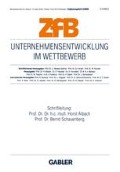Abstract
-
The emergence of the knowledge impacts strongly on economic organization; in fact, so strongly that many have argued that the traditional firm will wither, as firm boundaries blur and authority relations break down.
-
Analytically, this may be interpreted as a claim the Coasian firm will break down under the impact of knowledge becoming increasing distributed and controlled by specialists, as discussed by Hayek more than five decades ago.
-
However, this note argues that this conclusion goes too far: The Coasian firm is consistent with Hayekian knowledge conditions.
-
The challenge ahead is to carefully model the changes in economic organization prompted by the knowledge economy. Austrian economics and the modern economics of organization are particularly useful theoretical inputs.
This paper is my keynote speech to 63. Jahrestagung des Verbandes der Hochschullehrer fr Betriebswirtschaft e.v., 5–8 Juni in Freiburg i. Br. I am grateful for comments from the audience. More elaborate statements of the positions in this paper can be found in Foss (1999, 2001, 2002).
Access this chapter
Tax calculation will be finalised at checkout
Purchases are for personal use only
Preview
Unable to display preview. Download preview PDF.
References
Baker, George, Robert Gibbons, and Kevin J. Murphy. 1999. “Informal Authority in Organizations,” Journal of Law, Economics and Organization 15: 56–73.
Brynjolfsson, Erik. 1994. “Information Assets, Technology, and Organization,” Management Science 40: 1645–1662.
Casson, Mark. 1994. “Why are Firms Hierarchical?,” International Journal of the Economics of Business 1: 47–76.
Coase, Ronald H. 1937. “The Nature of the Firm,” in Nicolai J. Foss, ed. 1999. The Theory of the Firm: Critical Perspectives in Business and Management, Vol II. London: Routledge.
Coombs, Rod and Stan Metcalfe. 2000. “Organizing for Innovation: Co-ordinating Distributed Innovation Capabilities,” in Nicolai J Foss and Volker Mahnke, eds. Competence, Governance, and Entrepreneurship. Oxford: Oxford University Press.
Cowen, Tyler and David Parker. 1997. Markets in the Firm: A Market Process Approach to Management. London: The Institute of Economic Affairs.
Foss, Nicolai J. 1999. “The Use of Knowledge in Firms”, Journal of Institutional and Theoretical Economics 155: 458–486.
Foss, Nicolai J. 2001. “Misesian Ownership and Coasian Authority in Hayekian Settings: The Case of the Knowledge Economy,” forthcoming in Quarterly Journal of Austrian Economics.
Foss, Nicolai J. 2002. “Coase vs Hayek: Economic Organization in the Knowledge Economy,” forthcoming in International Journal of the Economics of Business.
Grant, Robert M. 1996. “Prospering in Dynamically-Competitive Environments: Organizational Capability as Knowledge Integration,” Organization Science 7: 375–387.
Hart, Oliver. 1995. Firms, Contracts, and Financial Structure. Oxford: Oxford University Press.
Hayek, Friedrich A. von 1948. Individualism and Economic Order. Chicago: University of Chicago Press.
Helper, Susan, John Paul MacDuffie, and Charles Sabel. 2000. “Pragmatic Collaborations: Advancing Knowledge While Controlling Opportunism,” Industrial and Corporate Change 9: 443–487.
Hodgson, Geoff. 1998. Economics and Utopia. London: Routledge.
Holmström, Bengt. 1979. “Moral Hazard and Observability,” Bell Journal of Economics 10: 74–91.
Holmström, Bengt. 1999. “The Firm as a Subeconomy,” Journal of Law, Economics, and Organization 15: 74–102.
Holmström, Bengt and Paul Milgrom. 1994. “The Firm as an Incentive System,” American Economic Review 84: 972–991.
Jensen, Michael C. and William H. Meckling. 1992. “Specific and General Knowledge and Organizational Structure,” in Lars Werin og Hans Wijkander, eds. 1992. Contract Economics. Oxford: Blackwell.
Kirzner, Israel M. 1997. “Entrepreneurial Discovery and the Competitive Market Process: An Austrian Approach,” Journal of Economic Literature 35: 60–85.
Liebeskind, Julia Porter, Amalya Lumerman Oliver, Lynne G. Zucker, Marilynn B. Brewer. 1995. Social Networks, Learning, and Flexibility: Sourcing Scientific Knowledge in New Biotechnology Firms. Cambridge: NBER Working Paper No. W5320.
Mendelson, Haim and Ravindran R. Pillai. 1999. “Information Age Organizations, Dynamics, and Performance,” Journal of Economic Behavior and Organization 38: 253–281.
Miles, Raymond E., Charles C. Snow, John A. Mathews, Grant Miles and Henry J. Coleman, Jr. 1997. “Organizing in the Knowledge Age: Anticipating the Cellular Form,” Academy of Management Executive 11: 7–20.
Mises, Ludwig von. 1949. Human Action. San Francisco: Fox and Wilkes.
Neef, Dale, ed. 1998. The Knowledge Economy. Boston: Butterworth-Heinemann.
Nonaka, Ikujiro and Takeuchi. 1995. The Knowledge-Creating Company. Oxford: Oxford University Press.
Prusac, Laurence. 1998. “Introduction to Series - Why Knowledge, Why Now?,” in Dale Neef, ed. 1998. The Knowledge Economy. Boston: Butterworth-Heinemann.
Siebert, Horst, ed. 1995. Trends in Business Organization: Do Participation and Cooperation Increase Competitiveness? Tübingen: J C B Mohr.
Williamson, Oliver E. 1996. The Mechanisms of Governance. Oxford: Oxford University Press.
Zucker, Lynne. 1991. “Markets for Bureaucratic Authority and Control: Information Quality in Professions and Services,” Research in the Sociology of Organizations 8: 157–190.
Author information
Authors and Affiliations
Editor information
Rights and permissions
Copyright information
© 2002 Gabler-Verlag
About this chapter
Cite this chapter
Foss, N.J. (2002). Whither Economic Organization?. In: Albach, H., Schauenberg, B. (eds) Unternehmensentwicklung im Wettbewerb. ZfB-Ergänzungshefte, vol 2. Gabler Verlag. https://doi.org/10.1007/978-3-322-86555-7_7
Download citation
DOI: https://doi.org/10.1007/978-3-322-86555-7_7
Publisher Name: Gabler Verlag
Print ISBN: 978-3-409-11996-2
Online ISBN: 978-3-322-86555-7
eBook Packages: Springer Book Archive

